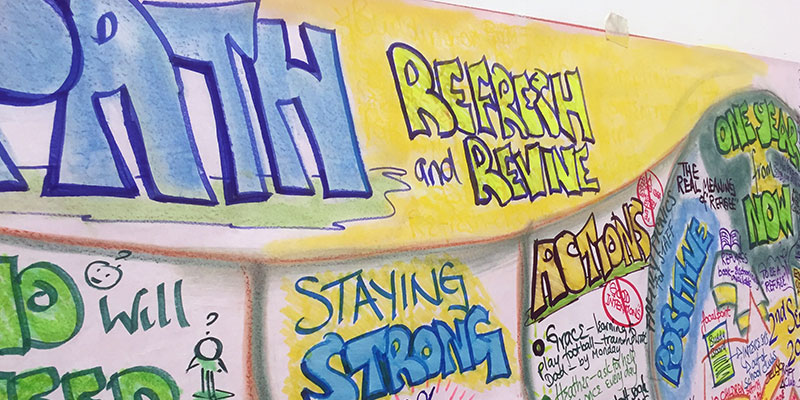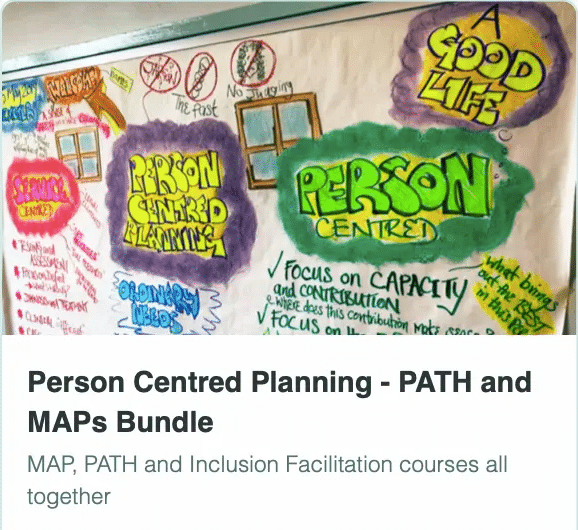
Person Centred planning using PATH and MAPs
Give your team the opportunity to pause and reflect on what matters most to them about the work they do. The act of listening to each other creates relationship and strengthens trust and inclusion within the team – in creating a shared vision, groups of people build a sense of commitment together.

Person Centred Planning using PATH and MAPs
Online Courses now available via Teachable Platform – Person Centred Planning Bundle (includes PATH, MAPs and Inclusion Facilitation courses) Learn at your own pace… lots of text and video support  |
Course Category
Person Centred Planning
Description
- What is Person Centred Planning?
- How is it different to any other kind of meeting or planning?
On this day all will become clear…
Give your team the opportunity to pause and reflect on what matters most to them about the work they do. The act of listening to each other creates relationship and strengthens trust and inclusion within the team – in creating a shared vision, groups of people build a sense of commitment together. They develop images of ‘the future we want to create together’, along with the values that will be important in getting there and the goals they want to see achieved along the way. Unfortunately, many people still think ’vision’ is the top leader’s job. In schools, the ‘vision task’ usually falls to the Headteacher and/or the governors or it comes in a glossy document from the local authority or the DfES. But visions based on authority are not sustainable.
Making inclusive action plans using full participation and graphic facilitation
Drawing on the planning tools MAPS and PATH (Pearpoint, Forest and O’Brien 1997) and other facilitation sources we use both process and graphic facilitation to enable the group to build their picture of what they would love to see happening within their organisation/community in the future and we encourage this to be a positive naming, not just a list of the things they want to avoid.
Jack Pearpoint, Marsha Forest and John O’Brien developed these innovative approaches in North America and they are being used successfully in many parts of the UK. The planning can focus on an individual, group or organisation and provides a powerful problem solving opportunity, which is flexible and robust enough for many occasions. Tell the story, find the dream, touch the nightmare, and explore who you are, what are the gifts and strengths of the person or group, what are the needs of those present and what is the action plan for the future?
Testimonials
“Really useful and informative.”
“I feel inspired to carry on now.”
“Now I get it!”
Learning Objectives
- Participants understand Person Centred Planning and its values and applications
- Participants have skills and confidence to facilitate PATH/MAP processes
- Participants learn graphic as well as process facilitation skills
- Strengthens practitioners inclusive practice
- Provides additional tools for those involved in inclusive work in schools and the community
- Further develop problem solving and planning skills
Who Is It For?
- Person Centred Planning Facilitators
- Multi Agency Teams
- Social workers
- CAMHS teams
- Year Managers
- Primary and secondary staff teams
- Early Years and School based Practitioners
- Heads and Deputies
- SENCOs
- Advanced Skills Teachers
- Primary and secondary teachers
- Local Authority Support Services
Course Content
The course answers the questions:
- Need to find new ways to bring Pathway Planning alive?
- Bored with annual reviews, transition plans and review meetings?
- Want to find a way of making meetings and planning feel more real and engaging?
- Need an approach, which engages a young person respectfully together with his or her family and friends?
- Want the ultimate visual record of the process of a meeting, which will help everyone, keep track?
- Want to problem solve and plan for the future of a small or large group, service or organisation up to the size of an LA?
Inclusive Solutions offer an introductory day to person centred planning or a 3 – 10 session course which is practical as well as values based. Participants will receive direct individualised coaching and training.
We will cover:
- The person being at the centre
- Family members and friends being full partners
- Planning reflecting the person’s capacities, what is important to the person and specifying the support they require to make a full contribution to their community
- Planning building a shared commitment to action that will uphold the person’s rights
- Planning leading to continual listening, learning and action and helping the person get what they want out of life.
- Essential Lifestyle Planning,
- PATH
- MAPS
- Personal Futures Planning.
If you liked this course you may well like:
Person Centred Planning and Support Services for Young People with Complex Needs
Trackback from your site.